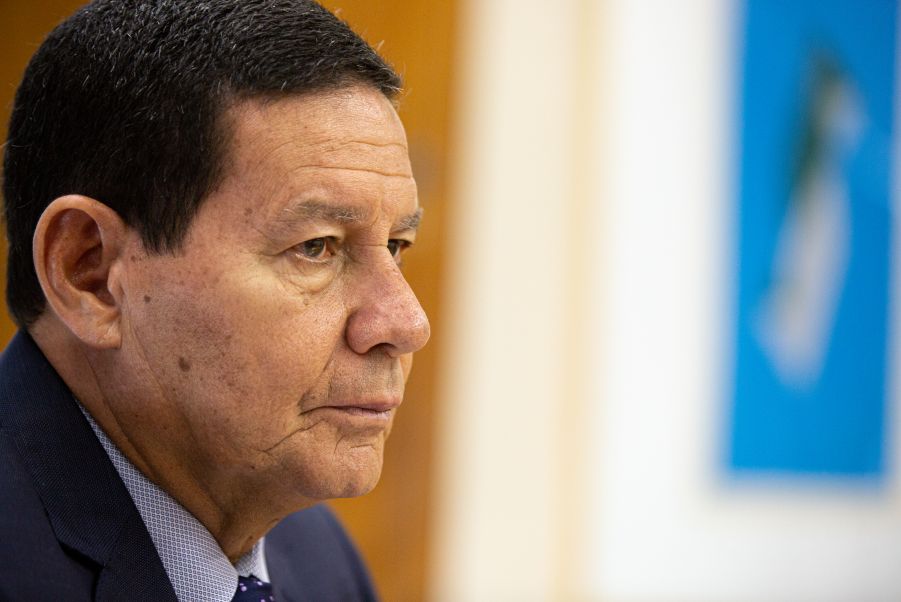Brasília – Brazil’s vice president Hamilton Mourão (pictured) says the country will uphold its strong ties with Arab countries in culture and trade. In an exclusive interview with ANBA, he discussed the economic ties that bind the two regions together, with Brazil as a major food producing country and Arab countries with a relevant demand for these items. “This creates a very strong connection,” said Mourão.
A little over seven months into his term, the VP has already visited an Arab country, Lebanon, where the Brazilian Navy is involved in a United Nations peace mission. Mourão is considering shifting Brazil’s work in Lebanon from off to onshore, since the Navy fleet needs renewing.
He argues that Brazil should go on being a broker of peace in Palestine, and that the country must join United States president Donald Trump’s initiative of providing financial aid to Palestine. “I think Brazil’s participation as a facilitator in this kind of agreement is important,” he said.
According to Mourão, president Jair Bolsonaro’s tour of Arab countries next October will be the time for signing on to agreements. “Especially with Saudi Arabia, which is a key gateway for regionwide trade,” he said. Mourão has had invitations to travel to the UAE and Saudi Arabia, but no plans are in place yet. He would like to see Brazil supplying defense industry products to Arab countries.
Check out the vice president’s interview with ANBA:
ANBA – What is the plan for this administration’s relations with Arab countries? What does the government want from relations with Arab countries?
Hamilton Mourão – The ties that bind Brazil and the Arab countries are long-standing, they go way back. Right now, 5% or 6% of Brazil’s population is of Arab descent. It’s a highly relevant number. We are in good standing with both Middle East and North Africa countries, there is no problem at all. We have a robust agenda in trade, culture, politics, a dynamic interchange with virtually all countries. We have 17 embassies in Arab countries, and there are 17 Arab embassies here – not necessarily from the same countries – and Brazil is also an observer state for the League of Arab States. The administration’s and president (Jair) Bolsonaro’s policy overrides these assumptions: a historical, age-old friendship and solid ties in trade and culture that will be honored.
Can Arab countries take part in any way in Brazil’s economic scenario, of an attempt to revive the economy?
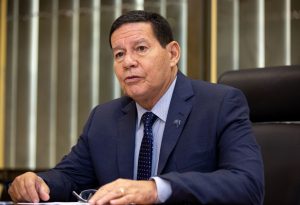
What I see today is that we have a very strong trade with Arab countries, in farm products, animal protein, and halal meats. Trade numbers are strong, at around USD 5 billion (exports from Brazil to Arab countries year-to-date through May), and a relevant trade. At a time when Brazil could be the great food supplier, the great producer of foodstuffs, and the Arab world requires these foodstuffs. This creates a very strong bond. At the same time, we can bring Arab technological prowess into Brazil. And then you have the defense industry. We were once major exporters of defense material to the Arab world, and we intend to resume that.
As a military officer, do you envision something Brazil and the Arab countries might do together when it comes to defense? Brazil’s defense industry does go to fairs in Arab countries, in Abu Dhabi, the UAE, for instance, but do you have any plans or personal intentions regarding this?
I think Brazil’s defense industry base needs leveraging, and the Arab market has needs we have the ability to meet, whether it be the Astros 2020 multiple rocket launcher system, the guided rocket, or wheeled armored vehicles, in which case we have the Guarani, which is well suited to those kinds of terrains. There’s a good space for defense industry cooperation between these two worlds.
Have there been any talks or agreements with Arab countries in that respect?
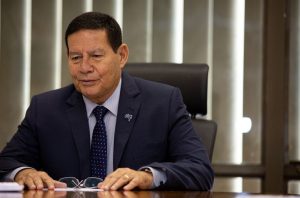
No. The agreements are moving forward, they come from a previous administration. We have no advances right now other than what was already in place. I believe that in October, during the president’s trip to China, he will travel to three Arab countries: Saudi Arabia, the UAE (and Qatar). That will be the time for reaching agreements, especially so with Saudi Arabia, which is a key gateway for regionwide trade.
President Jair Bolsonaro met with Saudi prince Mohammed bin Salman last July in the sidelines of the G20. What is the reason for this approaching Saudi Arabia?
Saudi Arabia is proving available and welcoming to agreements. They have resources to invest and are a gateway to the Arab world.
And what about the UAE? The Brazilian government is noticeably making overtures to the UAE. The Environment minister (Ricardo Salles) has been there, Marcos Pontes (minister of Science, Technology, Innovations and Communications) has been there as well.
It’s a technological issue. Of course, you also have the question of oil. One of the two ministers who went is the minister of Environment, and the environment is an issue that plagues our country. There is strong pressure on Brazil from European nations right now over Brazil’s environmental agenda. Marcos Pontes is from Science and Technology, and Arab countries have plenty of solutions in this field, due to the nature of the terrain. These solutions could be employed here, particularly in the Northeast.
This year you have been to Lebanon, where you visited the Brazilian-led UNIFIL Maritime Task Force (United Nations Interim Force in Lebanon). What were your impressions from that visit to Lebanon? Should Brazil go on collaborating with this mission and the UN in security affairs?
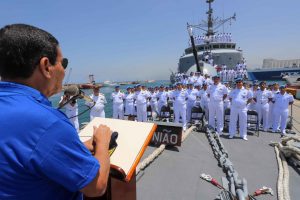
I went to Lebanon en route to China. We concluded that it would be an interesting stopover because we could visit the UNIFIL and show the Lebanese government our willingness and good will to follow through with the ties that we have, all the more so because I think there are more Lebanese people living in Brazil than in Lebanon itself. As for the participation in UNIFIL, the peace verification mission in Lebanon, in the naval arm that we have – since on the ground we have a few official Armed Forces observers, it’s a small contingent –, it has a lot to do with our Navy’s operational capacity. And our Navy is witnessing the end of a fleet. We have this project for our Classe Tamandaré corvettes, which will replace the frigates that are currently operating, so the whole problem revolves around operational capacity. Maybe, if by chance the Navy has to get out, we might try to get a Peace Force Battalion into the onshore portion of the mission.
Would there need to be a hiatus in the Navy’s participation in the Lebanon mission?
Yes, until the new corvettes start coming in, because manufacturing has just begun. I believe the first batch will be delivered in 2023. And these warships that the Navy has are from the early 1980s, they’re about to turn 40, spare parts aren’t found easily anymore. That’s the main problem.
Brazil has just taken over the presidency of the Mercosur, and the bloc has a free trade agreement with only one Arab country – Egypt, which is a big market. But many Arab countries, like Palestine, Tunisia, Morocco, Lebanon, they want agreements with the Mercosur. Brazil being in the presidency of the Mercosur, is there a chance some of these agreements will come to fruition, or at least be moved forward?
For some time now the Mercosur has been overly attached to ideological issues instead of being more pragmatic and flexible in seeking goals that could bring mutual benefits, not only to Mercosur member countries, but also to countries that might be the object of some kind of agreement. We have an ability to export and a number of products that are interesting to the Arab market, and the Arab market has things that interest us, so here’s where the mutual benefit comes in. In my eyes, Saudi Arabia, Algeria, Qatar, Egypt, the UAE, Oman, all these folks represent a highly rewarding market to the Mercosur, and what they have is also interesting to us.
Do you think Brazil and the Arab countries can work together at international instances like the UN and the WTO (World Trade Organization)? Are there unifying issues in that regard?
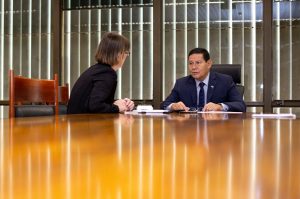
Yes. When it comes to the political issue in the Middle East, the most sensitive aspect of which is Palestine, Brazil has always striven for a peaceful concerted solution for the occupation of the territory. We are awaiting this agreement which the United States are championing, whose financial part is yet to be made public. It would provide some USD 50 billion in aid to the Palestinian people, and that would enable them to reorganize, to lead structured lives and to not live in conflict anymore. I believe that Brazil’s participation as a facilitator in this kind of agreement is important. Remember, we have been on a peace mission there before the Six Day War. Our troops were there from 1958 or 1959, I guess, until 1967. That’s eight or nine years of Brazilian presence in that region. I think we need to keep working. At the United Nations, we have always voted as a bloc, seconding each of the parties’ motions. I see a very good, very big alignment between Brazil and the Arab countries.
Do you think Brazil will go on playing the role of a broker of peace in the Palestine region?
Not only do I think so, but we must go on.
What about your personal relationship with the Arab countries? Had you ever been to any Arab country before Lebanon? Do you have any connection with the region?
I have very limited experience. It begins with friendships I have in Brazil with people of Arab backgrounds, I have great friends here, male and female. But the first time I set foot in an Arab territory was just now, in Lebanon. I have been invited to Saudi Arabia, to the UAE, but we are waiting for the best opportunity.
Are you slated to travel to any Arab country?
There are no plans yet, unless the president tasks me with something along those lines.
What will your role be in Brazilian international relations? I’m not sure whether that’s clearly defined or whether it happens as you go…
My role in Brazilian international relations depends on the president’s needs, on the tasks the president will entrust me with. Right now, because of my position, I chair high-level commissions with China, Russia, and Nigeria. The president gave me a task early into this year, at that Lima Group meeting, regarding the issue of Venezuela. At some point in time he may appoint me for meetings or talks with specific countries, but there’s no predefined mission.
Translated by Gabriel Pomerancblum



